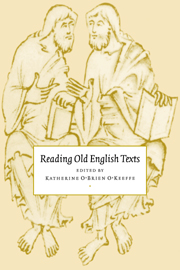Book contents
- Frontmatter
- Contents
- List of contributors
- List of abbreviations
- Note on the text
- Introduction
- 1 The comparative approach
- 2 Source study
- 3 Language matters
- 4 Historicist approaches
- 5 Oral tradition
- 6 The recovery of texts
- 7 At a crossroads: Old English and feminist criticism
- 8 Post-structuralist theories: the subject and the text
- 9 Old English and computing: a guided tour
- Suggestions for further reading
- Index
7 - At a crossroads: Old English and feminist criticism
Published online by Cambridge University Press: 18 December 2009
- Frontmatter
- Contents
- List of contributors
- List of abbreviations
- Note on the text
- Introduction
- 1 The comparative approach
- 2 Source study
- 3 Language matters
- 4 Historicist approaches
- 5 Oral tradition
- 6 The recovery of texts
- 7 At a crossroads: Old English and feminist criticism
- 8 Post-structuralist theories: the subject and the text
- 9 Old English and computing: a guided tour
- Suggestions for further reading
- Index
Summary
Evocative of choice, change, and even conflict, crossroads can be uncomfortable places. For some, feminism has been crossing Old English, or passing it by, for some time now; for others, the variety of contemporary feminisms and related post-modern theories – postcolonialism, performativity, border theory, subjectivity, and queer theory, for example – are themselves such diverging roads that it is hard to see how they converge with the discipline of Anglo-Saxon studies. In connection with the map of the relation between feminist criticism and Anglo-Saxon studies, moreover, there is one additional problem: the territory has barely been charted. Mapping involves consensus, and this consensus is as absent from the general area of feminist criticism in the humanities as it is from our own discipline. Feminism challenges our comfortable presuppositions about reading Old English texts: it asks difficult questions about our scholarly relationship to the period we study; it pays attention to the silences and omissions of our habitual methods by demanding a place in a field that once seemed constructed so as to ignore it; and – most uncomfortable of all, perhaps – it questions the past as well as the present and future. In short, by challenging so thoroughly the ideologies that inform our study of the past, feminism draws attention to its own ideological status as a practice committed to revision and reform. Feminism is after all a politics, not just a hermeneutic, and therefore troubling – sometimes to its adherents as well as to its opponents.
- Type
- Chapter
- Information
- Reading Old English Texts , pp. 146 - 169Publisher: Cambridge University PressPrint publication year: 1997
- 6
- Cited by



